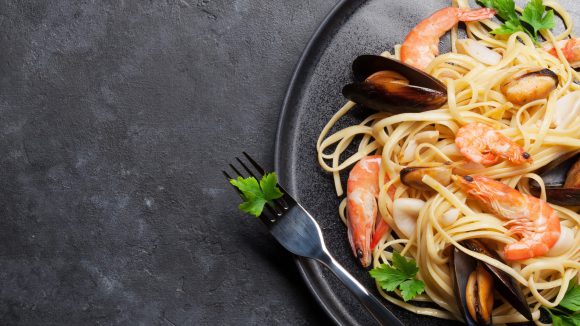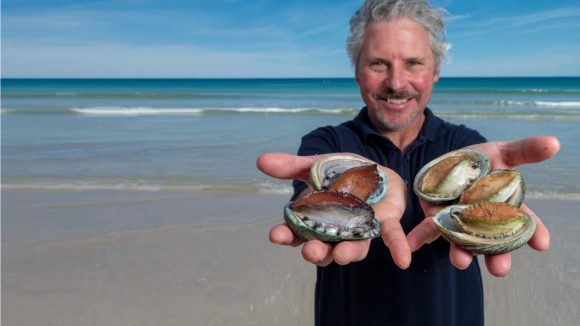
Learn more about meagre
Meagre (Argyrosomus regius) are sold under a number of guises, including shade fish, corvina, croaker, salmon bass and stone bass, but are simply known as meagre in international trade. Whichever name is chosen, this flavoursome, low-fat fish, which is similar in taste to a European seabass, deserves a spot on the dinner table!
In the wild
Meagre are found in the eastern Atlantic Ocean, including the Mediterranean Sea, Black Sea and Red Sea. A member of the Sciaenidae family, they are demersal fish, which are predominantly found close to the seabed, but also swim in the mid water column. Meagre return to the coast and into estuaries to reproduce and spawn between mid-April and late May. From mid-June to the end of July, these fish can be found feeding along the coastline, where they stay until autumn, when they return to deeper water for winter. For food, they mainly eat other fish and swimming crustaceans.
Meagre, along with seabass and seabream are perciforms, a type of bony fish, and all have many common attributes, which is why they are covered by the same ASC standard. A large fish, meagre can grow up to around 2 metres long and weigh up to 100kg.
Farming meagre
Meagre can be farmed on land in seawater tanks, but is mostly grown in the sea in net pens, predominantly on the Mediterranean coast in Greece, Spain, Croatia and Portugal. Meagre grows quickly and can reach marketable size faster than other similar species, while maintaining an excellent meat quality. They also have an undemanding nature and grow best in moderate temperatures, which might make this fish a good candidate for farming in the Mediterranean Sea and Atlantic coast of Europe in a future, warmer climate.
Despite being idea for aquaculture, meagre was a latecomer to the fish farming scene, and was first grown commercially in France in the late 1990s. Annual production of meagre is currently around 25,000 tonnes, with a lot of potential for future growth.
Farmed meagre are harvested at weights between 1kg and 3kg, and are typically sold as fillets.
Impacts of farming meagre
ASC certified meagre farms minimise impacts on their local ecosystems by developing and implementing an impact assessment to protect key wild species and sensitive habitats in the proximity of the farm, protecting the ecological quality of the seabed, ensuring farms are not sited in High Conservation Value Areas (HCVA), and keeping fish escapes to an absolute minimum. Lethal action against predators/wildlife on the farm is prohibited, as is the use of submerged acoustic deterrent devices (ADDs).
Feed
ASC certification requires meagre farms to adhere to strict limits to minimise the use of wild fish as an ingredient for feed. In addition, the standard requires farms to ensure full traceability back to a responsibly managed source, preferably certified, both for wild fish and other ingredients. Potential use of any GM/transgenic plant raw material in the feed must be documented. Feed input for meagre is significantly lower than for some other fish aquaculture species.
Pollution
ASC certified meagre farmers are required to measure a number of water parameters including phosphorus levels and the amount of dissolved oxygen at regular intervals, to ensure they remain within set limits. Copper release into the water must be minimised and monitored, and there must be evidence that biological and non-biological wastes are either disposed of properly, appropriately stored or recycled.
Diseases
ASC certified meagre farms are required to adhere to rigorous requirements to minimise disease outbreaks. Meagre are a robust fish which are not highly susceptible to disease, but a Fish Health Management Plan (FHMP) detailing steps for biosecurity management must be developed under supervision of a veterinarian and implemented on the farms.
Social
ASC certification imposes strict requirements based on the core principles of the International Labour Organisation (ILO), which include prohibiting the use of child labour, or any form of forced labour. All ASC certified farms are safe and equitable working environments where employees earn a decent wage and have regulated working hours. ASC meagre farms must also consult with local communities to ensure that any complaints are resolved in a timely manner.
Emissions
Meagre, in comparison to some other animal proteins, is considered to have a relatively low carbon footprint due to their fast growth, especially in the early stages, but all ASC farms must monitor the energy used to produce the fish and its feed, and to record any greenhouse gas emissions, to ensure levels remain as low as possible.
Eating meagre
Meagre is less well known than its counterparts, seabass and seabream, but is a good, sustainable whitefish choice. Meagre has a firm and fleshy meat texture and mild taste, making it suitable for frying, baking or grilling, and also for steaming, smoking or even marinating raw as ceviche. Most seabass or seabream recipes can be easily substituted for meagre.
Explore More

Learn more about Seafood Farming
Find out how farmed seafood can help feed a growing global population, why fish farming needs to be done responsibly and how you can make a responsible choice.

Visit our Blog
Find out what’s behind the label, what’s going on in the world of aquaculture and how the Aquaculture Stewardship Council is updating and improving its programmes regularly.

The Aquaculture Stewardship Council
We run the world’s leading certification programme for responsibly farmed seafood. Learn about our Certification Programmes and our Impact.



